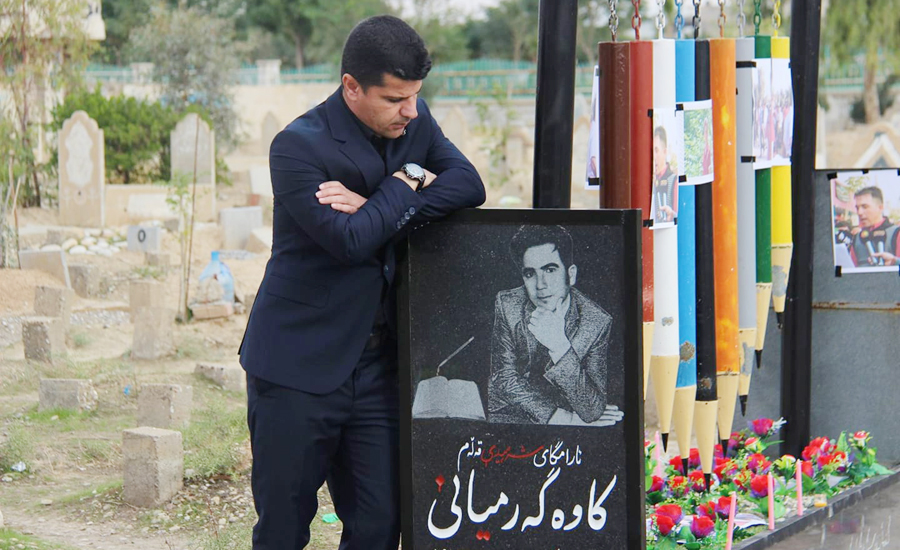“Following October 16th 2017 events, I was not so pleased as now to laugh heartly,” said the policeman who escorted us from the demonstrations to police station of Khanaqin, a district northeast of Diyala province.
He was eager to talk about the withdrawal of Peshemerga (Kurdish fighters) and Asayish (security) and the end of Kurdish dominance over Khanaqin (and the disputed territories between Baghdad and Erbil).
“We used to have all power here but now you see a captain from Baquba (center of Diyala province, home to Arab community) of federal police in front of Kurdish officers, higher in rank than him, has ordered your arrest and we had to follow it,” the policeman sadly said.
The Iraqi government, following declared victory of the Islamic State ISIS, has launched (Imposing Law) process in the disputed territories to takeover power and oust the Kurdish forces from territories they controlled since fall of Saddam Hussein regime in 2003 and marched forward in 2014 when Iraqi forces evacuated some region following ISIS attacks.
This is Garmiyan Hamay Poor, correspondent of Nalia Radio and Television NRT, an intendent media agency based in Sulaymaniyah, in Garmiyan region. I have always been subject to threats and intimidation especially for coverage of ISIS moves and attacks in Khanaqin and its suburbs.
One day, brigadier-general Diyar Shawkat, Khanaqin police chief, told us that we are not allowed to cover Khanaqin, a multi-ethnic town for Kurds, Arabs and Turkmens.
“You broadcast ISIS attacks in Khanaqin which intimidates people so you are not allowed to go into Khanaqin for media coverage, even for a covering party.”
You are not allowed to go into Khanaqin for media coverage
In response to the police chief threat, I told him that I have the right of media coverage per law. He got angry and said he will ask police to arrest me at the entrance of Khanaqin checkpoint.
I couldn’t reject
On October 29th, 2019, I have got a phone call from someone introduced himself as Nabil, a civic activist from Khanaqin. He told me in support of Baghdad al-Tahrir square protestors, they organized civil and peaceful demonstration and want me to cover it for the media.
NRT: Khanaqin correspondent detained for a while
I didn’t want to tell him that police have threatened they will arrest us for any media coverage of Khanaqin and thought he might not take it so I decided to take the risk. I departed Kalar to Khanaqin.
Fortunately, policemen in the checkpoint have not recognized me so we made it easily into town. At the Aziz Pishtiwan square downtown, the crowds were enthusiastic when they saw us as there was no any other TV channel. The security forces went crazy and attacked me and my cameraman and took our equipment but the demonstrators stopped them.
The situation went tense that security forces and the demonstrators were about to clash.
Most of the demonstrators were young people who were fed up of unemployment, being penniless, lack of proper public services and utilities and poor living conditions of themselves and their families.
One of the Kurdish policemen called me and took me to an Arab office, a captain. As if we were criminals, he went frown and asked, “how you made it here without permission?”
He went frown and said how you made it here without permission?
I told him its legal and I made no mistake and his ban of coverage is illegal and crime, he went hysterically angry. His knowledge of law was equivalent to his knowledge about Kurdish.
He yelled at the policeman to handcuff me yet some other Kurdish officer, higher in ranks, were around and asked the policeman to take me to Khanaqin police station.
Waiting for police chief in detention
The scene of powerless Kurdish officers in front of an Arab office lower in rank was shocking for me. The policeman who took us to police station has felt my concerns and said, “I know he was really impolite. This officer is flattering the chief and has upper hand in the station.”
We were detained for two hours in a small room and my cameraman Ali kept asking whether we will be released or detained over the night. Ali was siting in front of a window overlooking the yard of the police station leading to the entrance and could see all coming in.
The policemen told us they are waiting for the chief, who was out on a mission, to decide our destiny. Suddenly we heard the break of a vehicle and the policemen stood by actively, a sign the chief is back.
We have been waiting for a while till they told us the chief is ready. The chief welcomed us, apologized and showed lots of respect. “I have warned you many times not to come to Khanaqin for coverage o I will take all your equipment and put you in prison. This is the last time.”
I have decided to file no lawsuit because once I reported my case to police and they kept calling me tens of times without any concrete results since law is not sovereign.
Currently, I am banned by an order of police chief from coverage of one of the heat areas where bombings occur, militants attack villagers, farmers are abducted and farm are dried. Almost every day, there is a new story which I can’t go to dig and cover for my TV channel.





